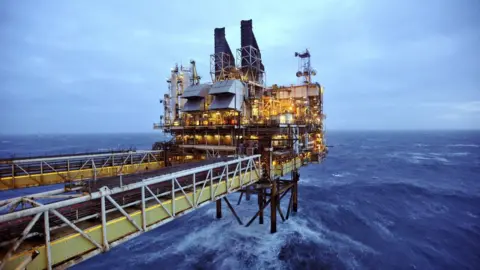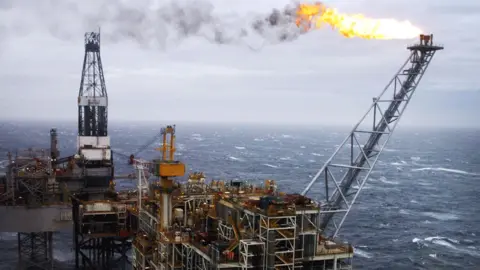Value of Scottish North Sea oil and gas rises by 15.2%
 Reuters
ReutersAn increase in production and prices has boosted the value of Scottish North Sea oil and gas, according to new figures.
Official statistics showed oil and gas production in Scotland rose year-on-year by 2.9% in 2016-17 to about 74.7 million tonnes of oil equivalent.
The figure, which represented 82% of total UK production, was the highest since 2011-12.
The approximate sales value was £17.5bn - 15.2% higher than in 2015-16.
Scottish government statisticians attributed the rise in revenues to the increase in production and a rise in prices towards the end of last year and during the first quarter of 2017.
Operating expenditure, excluding decommissioning, was estimated to be £5.9bn - similar to the previous year, despite the increase in production.
Capital expenditure was down from £10.1bn to about £8bn.
'Bright future'
Energy Minister Paul Wheelhouse said: "Scotland's oil and gas industry has a bright future, and it is encouraging to see this continued increase in production which has risen by a total of 25% over the last two years.
"These figures show that confidence is continuing to return to the sector after a number of challenging years."
Meanwhile, a new group has been formed to support the oil and gas sector.
It follows the winding up of the Energy Jobs Taskforce, which was established by First Minister Nicola Sturgeon in early 2015 as companies struggled in the face of falling oil prices.
The Oil and Gas Industry Leadership Group, co-chaired by Mr Wheelhouse, aims to "take forward" the work of the taskforce.
According to the Scottish government, the taskforce provided "targeted help" to 800 companies, while assisting 4,200 people facing redundancy.
It said oil and gas innovation spend almost trebled last year, with Scottish Enterprise providing £15.9m for 82 companies to deliver 111 projects.
 PA
PAFollowing the final taskforce meeting, Ms Sturgeon said: "The Energy Jobs Taskforce has been a catalyst for culture change, ensuring companies innovate and remain competitive while helping thousands of individuals.
"It has made a vital contribution to strengthening the oil and gas sector, laying the foundation for a positive future for the North Sea economy.
"With employment levels beginning to stabilise, the signs of improvement are encouraging.
"However, I fully appreciate that challenges remain and we will continue to work with industry to ensure the recovery is sustained."
'Significant journey'
Scottish Enterprise chief executive Lena Wilson, who chaired the taskforce, said: "Scotland's oil and gas sector has been on a significant journey and, while there's still work to do, the taskforce itself has met its original objectives.
"The time is right for the work of the taskforce to become mainstream business for the various organisations involved and Scottish Enterprise will continue to work closely with the sector to help it respond to challenges and opportunities ahead."
Deirdre Michie, chief executive of industry body Oil and Gas UK, said: "Over the last few years, the taskforce has provided helpful support to those who lost their jobs in a challenging climate for our industry.
"Work by the taskforce also contributed to the development of Vision 2035, which industry is focusing on working towards."
